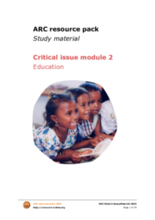Introduction
Education is the key that can unlock the doors to prosperity and development. It is a key index to measure development and communities often prioritise education as the only means to influence their future for the better. Education is a right of all human beings and in emergencies it is both life sustaining and life saving in providing physical, psychosocial and cognitive protection to affected children and adolescents affected by emergencies.
Education services are also one of the most important means of restoring the sense of preemergency routine in the lives of children and adolescents and their communities. Education in emergencies plays a key role in facilitating the psychological healing of children and adolescents by providing the necessary space for peer interaction and re establishing a sense of normalcy postemergency.
In this module, the term education is used to define a lifelong process where individuals continue to learn: they learn how to cope with their immediate environment; how to cope with life’s challenges; how to equip themselves to understand the world around them; and how to access more knowledge, skills and information which may improve their prospects for growth and achievement. There is also an emphasis on understanding the vital need for reestablishing education during and after an emergency so as to minimise the psychological impact of the event and maximising the opportunity to strengthen preexisting education structures.
Five topics are covered within this module, but there are also many educational issues, which are linked with topics in other Critical issue modules such as: Critical issue module 4 Sexual and reproductive health; Critical issue module 5 Landmine awareness and Critical issue module 7 Children associated with armed forces or armed groups. Facilitators are advised to use the Education module alongside other modules, including Foundation modules, when dealing with issues of education in these other contexts.

